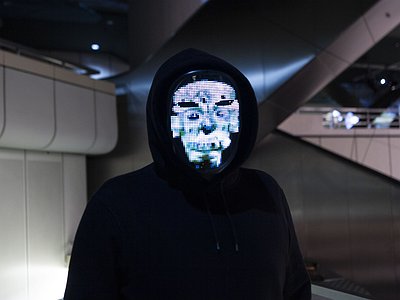Name: Moisés Horta Valenzuela aka Hexorcismos
Occupation: Sound artist, technologist, electronic musician
Nationality: Mexican
Current release: Hexorcismos's MUTUALISMX is out via Other People. Making use of SEMILLA.AI, a neural audio synthesis tool created by Hexorcismos himself, the project represents a collaboration between AI, humans, and human representations as generated by the model (AI mutuals). The artists involved include Ale Hop, Debashis Sinha, KMRU, Jessika Khazrik, and Simina Oprescu.
[Read our Ale Hop interview]
[Read our Debashis Sinha interview]
[Read our Simina Oprescu interview]
Hexorcismos will also present MUTUALISMX at this year's Sónar Festival. For more information, visit the Sónar website.
If you enjoyed this Hexorcismos interview and would like to know more about the project, visit him on Instagram, twitter, and Soundcloud.
You've already spoken about your interest in decolonising AI. What kind of biases are there in existing AI when it comes to music?
It is important to note that AI technology is already embedded in many forms of colonization and its legacies. This ranges from the basis of the minerals extracted in Congo, and many other parts of the Global South to power the GPUs used to train AI models, to the massive nonconsensual data scraping of data in huge models like GPT-4. To talk about decolonization without acknowledging this is difficult.
Having said that, I think there is a space to rethink these practices through what AI scholar Tiara Roxanne calls the ‘decolonial gesture’, where you know that the technology itself, as it currently is, holds many of these legacies - but we can present other ways to subvert the logics of colonialism with these already present tools.
One of the ways I try to enact these approaches in my work in music is to represent and include music coming from my own cultural background, which I have been involved with and contributing to even before working with AI. To include music coming from my hometown of Tijuana and the so-called ‘Global South’ within the narrative of AI artmaking practices using these systems.
One of the main reasons I got into AI music and neural audio synthesis was precisely to explore the ways that these technologies could be re-appropriated from the biases of the Western canon in music, and honor musical traditions that were not present in AI music research.
I’m not striving to mimic these styles of music and genres using machine learning, but rather, understand and include them in my own music and art making process to create something new; embracing the imperfections in these algorithms and, at the same time, make these technologies more accessible to a public which can see their culture reflected in this space. I think that’s how you get more people involved to change the narrative and material basis of a certain technology.
This approach plays into MUTUALISMX, as I see the artist-centered approach to curate datasets, artist-owned AI music models as a form of sovereignty and cooperative approach, as another way to hopefully ‘decolonize’ the approaches to this technology.
This is more of a social issue than a technical issue. There is no ‘fix’ or ‘update’ to fix the inherent legacies present in these technologies.
The press release to MUTUALISMX closes with this statement: “Operating outside of academia and capitalist enterprises, MUTUALISMX proposes an alternative future – one without borders that’s not beholden to the Western canon, where independent labor can be prioritized and celebrated, and where creativity can truly flourish.” Realistically, how do you rate the chances of this alternative future coming to pass?
I do really think that we will start seeing this approach more and more, given that our current systems, call it Capitalism, call it the ‘Western canon’, are showing their cracks and failures in the face of ecological collapse and the current wars and genocides in Palestine and beyond. This will be the case for a big part of the population of the world, for a majority.
What I see is that there will be the ‘business as usual’ advance in arts, music and technology; talking about mass-marketed music and entertainment. I really don't see this as changing anytime soon.
What was meant by this [statement in the press release] is more like laying a blueprint that says ‘approaches like these can be possible’, and that we have to rethink exactly the ‘mass consumer’ approach and potentially create pockets of decentralized and pluralized visions towards music and arts, with or without AI.




